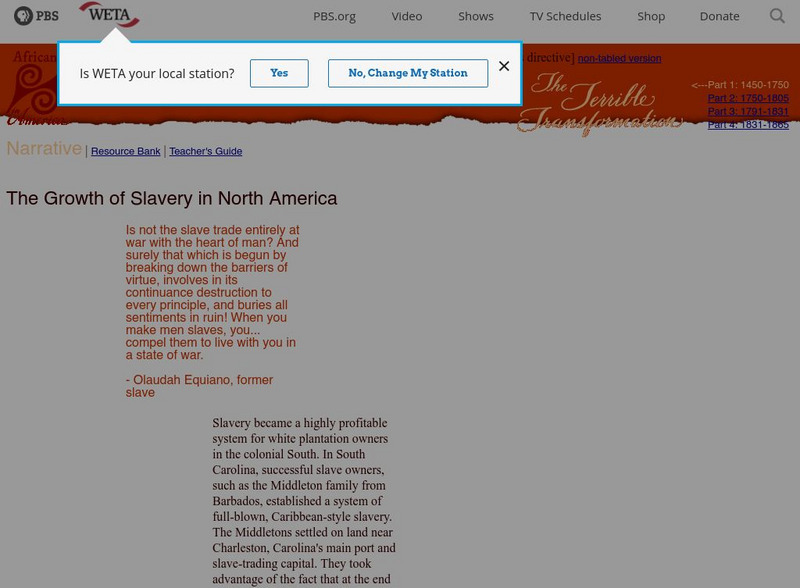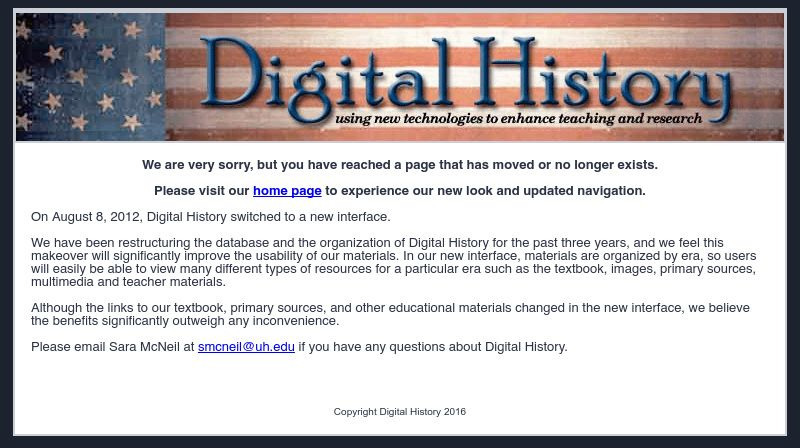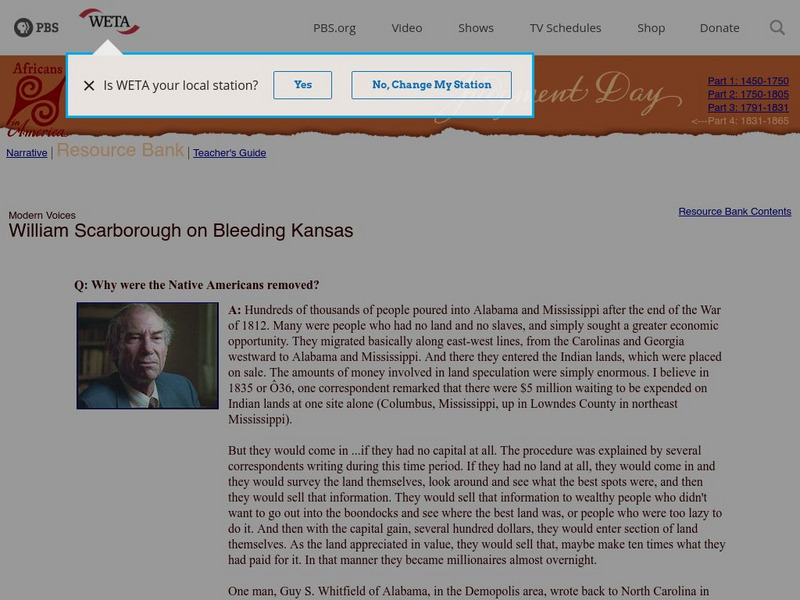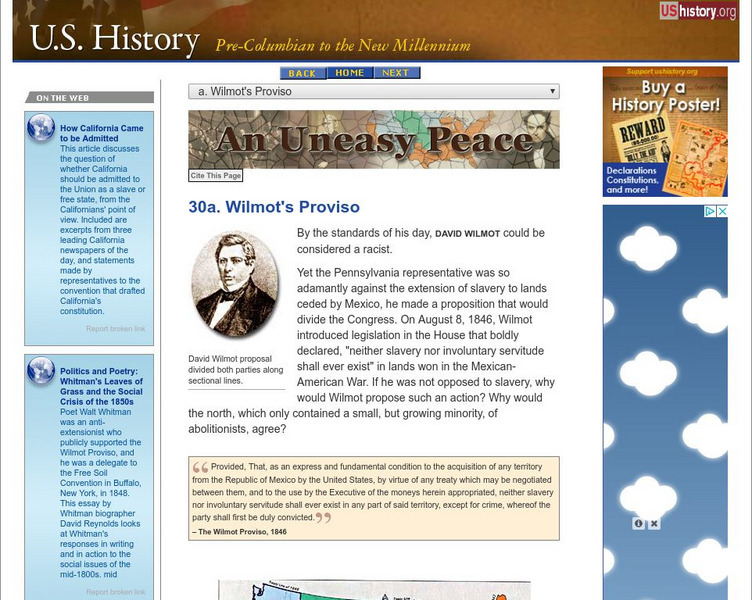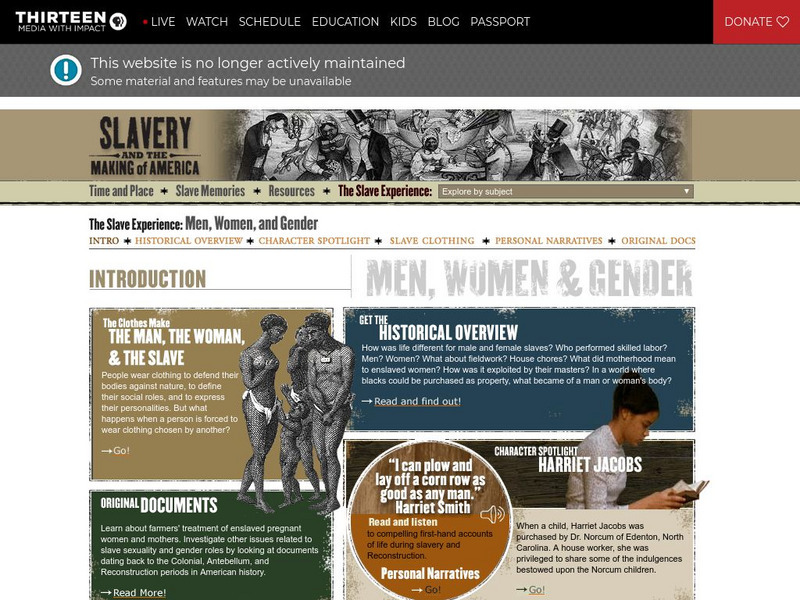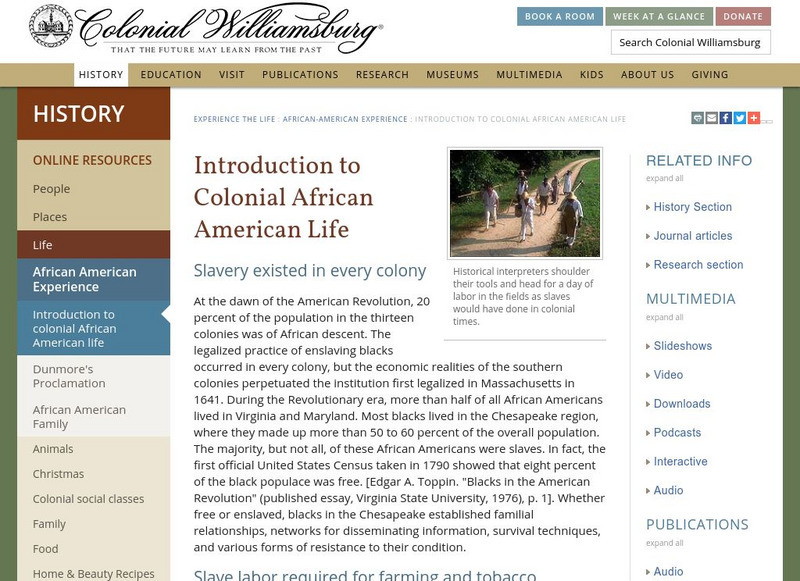Curated OER
Afro-Caribbean Americans and the Sugar Economy
Students read the narrative, Caribbean Immigration and examine how sugar production and migration of people of African origin have been intertwined for centuries. Working in three groups, they present oral reports on the three eras of...
Curated OER
The Terrible Transformation: Freedom Denied
Pupils learn about the legal foundations for slavery and explore autobiographical writings of slaves. Students trace the development of laws that enforced the slave status of Africans and their descendants.
Forum Romanum
Outlines of Roman History: Times of the Gracchi: Causes of Civil Strife
In a chapter from William Morey's 1901 textbook, he explains the make-up of the Roman populus at the beginning of the Late Republic.
Other
New Mexico Office of the State Historian: Pope
Read this fascinating information about Pope, the leader of the Pueblo Revolt of 1680. Learn how he was able to unite several tribes of Pueblo Indians who did not even speak the same language into a force that was able to push out the...
Other
Hillcrest High School: The Colonies Come of Age: The Agricultural South [Pdf]
A chapter from a history text that looks at the plantation economy of the Southern colonies, which relied on slave labor. It discusses the role of women as second class citizens, the cash crops that were grown, indentured servitude, the...
Other
Mo Ad: Slavery Narratives
A collection of narratives taken from autobiographies, letters and diaries of slaves. Read the text or listen to the haunting stories.
Other
Child Labor Coalition
The Child Labor Coalition (CLC) exists to serve as a national network for the exchange of information about child labor, protect working minors, end child labor exploitation, and develop public education to combat child labor abuses.
PBS
Wnet: Thirteen: Freedom: A History of Us: Wake Up, America!
This resource covers the changing of America due to the Industrial Revolution which brought in not only new technology but also opened the door to reform movements. From the series by Joy Hakim, "A History of Us." Includes a teacher's...
Other
United States History: Ch. 3 Sec. 1: The Southern Colonies [Pdf]
A chapter from a history text that looks at the development of the Southern Colonies. It discusses the Southern agricultural economy that relied on slave labor, tobacco as a cash crop, Southern society, indentured servitude, Bacon's...
PBS
Pbs: Africans in America: Part 3: Impact of the Cotton Gin
An African American associate professor of history at Cornell discusses the impact of the cotton gin on slavery.
PBS
Pbs: Cet: Africans in America: The Growth of Slavery in North America
Discusses the economics of slavery in South Carolina and its importance to the profitable growing of rice. It continues with ways the slaves were controlled and punished in South Carolina and Georgia. Click on Teacher's Guide for teacher...
Digital History
Digital History: From Slave Labor to Free Labor
The most difficult task confronting many Southerners during Reconstruction was devising a new system of labor to replace the shattered world of slavery. Learn how plantation owners and freed slaves adapted to this massive shift in the...
Forum Romanum
Outlines of Roman History: Decline of the Empire: The Times of the Severi
In this entry from Morey's 1901 textbook the decline of the Roman Empire is presented. The Severi emperors ranged from bad to worse, with the exception of Alexander Severus.
Digital History
Digital History: The Political Crisis of the 1840s
Read about the attempt to keep slavery out of the newly acquired Mexican Cession, and so how this attempt revealed an increased split between North and South.
Digital History
Digital History: Slave Labor
Not all slaves worked in the fields. Read about the jobs of many skilled workers who were slaves in the South. Read also about the slaves who were field hands and find out about the harsh labor conditions they endured.
The History Place
The History Place: Statistics of the Holocaust
This page from The History Place has a chart with the number of Jewish people killed in the Holocaust. Nearly 6 million Jewish people were murdered. This site is disturbing its apparent accuracy of the Jewish slaughter.
PBS
Pbs: Aia: William Scarborough: Why Were the Native Americans Removed?
A discussion by Dr. William Scarborough about the migration into Alabama and Mississippi after the War of 1812. Whites not only displaced the Indians, but also eventually brought in thousands of slaves.
Duke University
Plantation America: The Work of Slaves
On this webpage, the primary text contains selected entries from letters and journals. It also describes slaves delivering rice to Savannah, slave numbers, their condition on a plantation, how slaves were used, and a map and a drawing of...
Independence Hall Association
U.s. History: Wilmot's Proviso
Congressman David Wilmot, even before the end of the Mexican-War, proposed legislation that would outlaw the expansion of slavery into the new territory, should the United States acquire it. Read about his reasons for proposing the...
PBS
Wnet: Thirteen: Slavery & Making of America: The Slave Experience: Men, Women & Gender
Learn about issues related to slave gender roles at this PBS series site that features illustrations and documents dating back to the Colonial, Antebellum, and Reconstruction periods in American history.
Other
Binghamton University: Lincoln, Labor and Liberation
The free labor ideology of the nineteenth century was grounded in the beliefs that Northern free labor was superior to Southern slave labor. It was this free labor ideology and not the republicanism of the Revolutionary War era that...
Curated OER
National Park Service: Rice Cultivation in Georgetown County
Describes the planting, cultivating, harvesting, and preparing rice in the antebellum South. Contains review questions.
Colonial Williamsburg Foundation
Colonial Williamsburg: Colonial African American Life
Provides a few statistics on slaves in Maryland and Virginia and then contrasts the lives of field hand vs household or urban slaves.
Curated OER
National Park Service: Plantation Agriculture: Coastal Rice
Brief description of coastal rice plantations in the late 18th and early 19th centuries from the National Park Service.




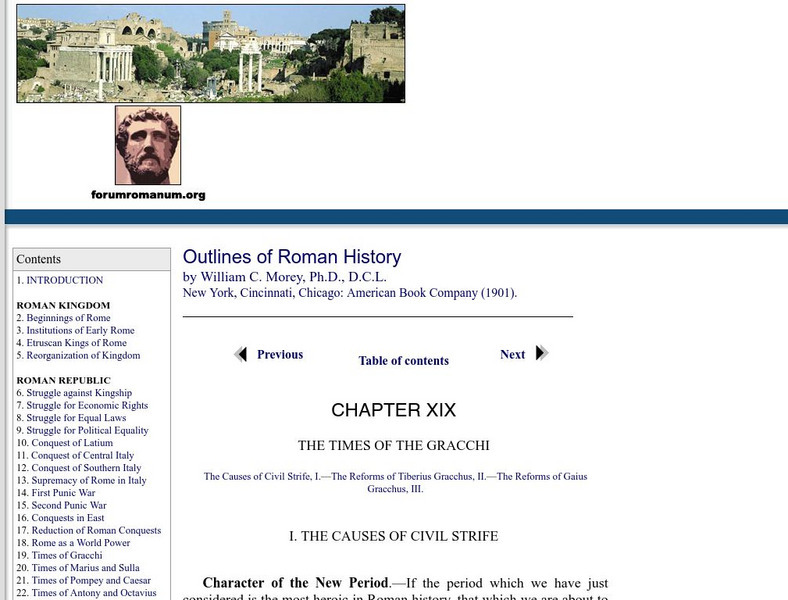

![Hillcrest High School: The Colonies Come of Age: The Agricultural South [Pdf] eBook Hillcrest High School: The Colonies Come of Age: The Agricultural South [Pdf] eBook](https://d15y2dacu3jp90.cloudfront.net/images/attachment_defaults/resource/large/FPO-knovation.png)


